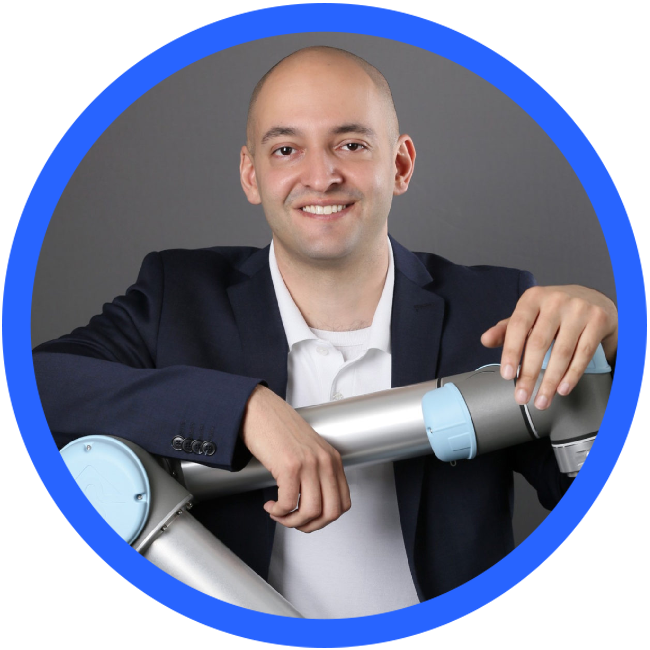How a New Way of Working Took Hold at Universal Robots


Rob Hernandez is a practiced product developer and strategist in the automation space. Together with The Lean Startup Co., he has started UR LABS, a division of Universal Robots focused on using Lean Startup tools to discover and validate innovative new technology products.
What does your job at Universal Robots entail, and how is Lean Startup involved in that?
I’m here to kickstart the innovation engine. When the company first got started, it was really focused on “How do we scale bringing this new product to market?” There’s really not been a whole lot of attention around: “What else could we do to help customers in the automation space? What else could we do to make some auxiliary revenue streams, or to really reduce friction in the customer journey?” The company didn’t have the chops to explore those questions in an efficient way. We had not really developed a whole lot of customer intimacy. We were looking at different ways that we could potentially go about developing that customer intimacy and exploring a lot of different avenues and different customer processes as quickly as possible. That’s when Lean Startup became an option.
My role first and foremost is to coach different incubators on using Lean Startup to perform product-market fit searches. The second thing is to help the senior stakeholders manage the portfolio of programs and make sure that we have enough irons in the fire, in the right places, according to our strategy.
Were you brought in specifically to do this, or did you come in to do something else and then identify this need?
I was a product manager at a parent company, Teradyne, which sells semiconductor equipment to very large semiconductor manufacturing companies, so customer intimacy is a must. Teradyne also has very few customers, so while I wouldn’t say it was easy to develop that customer intimacy, it did develop over the years of doing business. I came to Universal Robots to help with auxiliary revenue stream strategy — services, training, things like that. I found out very quickly that the way Teradyne does product development would not work at Universal Robots. We couldn’t just talk to five customers and get it right. Five customers for semiconductors would be half of the market share. Five customers at Universal Robots is a drop in the bucket.
We needed something else that was a scalable way to do research. Early on, Universal Robots was a rapidly growing company. I was just trying to help hold it together while we were growing. But last year we said, all right, we really need to put irons in the fire for new product development. Lean Startup taught us a lot of really great ways to reduce uncertainty and focus on the right things. There were a lot of crazy ideas, and we had to remove some of the crazy with some evidence.
The notion of calling out assumptions and focusing the organization on validating or invalidating them has permeated beyond our accelerator program and is actually in every product team around the company now.
How do you think Lean Startup has changed the way the company works? Are there any specifically significant changes?
The most significant way it’s changed us, even outside of the accelerator projects, is that anyone who’s been involved in one of these incubators is starting to go around and challenge everyone else by saying, “That’s an assumption.” The notion of calling out assumptions and focusing the organization on validating or invalidating them has permeated beyond our accelerator program and is actually in every product team around the company now. They all do an assumptions mapping before they consider launching a new product. They all go through some type of search, whether it’s full-blown Lean Startup, or some kind of quick validation research. That has changed everything. Before we went on this journey, we weren’t doing that.
Can you say anything about the challenges and success of grafting this new way of working onto an existing company, as opposed to building a new company and starting up with it from the beginning?
The biggest challenge is around resourcing. Early on, people don’t know what these programs are going to do. They don’t know what the Lean Startup is going to do, and they’re living with very hard performance metrics. So when you ask for a resource or you tell them to dedicate resources half time or full time, it’s a big ask. A startup company may be able to say, “Hey, this is our lifeblood. We’re just choosing a method of working.” An enterprise company is saying, “We already have a core business. This is something auxiliary, so how do we make sure it doesn’t distract from the core business?” I think that’s a challenge that enterprise companies like ours have. The way we got past it was twofold. One, we brute-forced a few projects, and stakeholders and managers in the organization were able to see the value. The second thing was we really enhanced the role of a sponsor. The sponsor didn’t have to be someone who was in this labs division, or an executive. The sponsor was any manager with a budget who had an idea that they wanted to pursue. And that allowed them to view this as an empowerment for them to achieve their strategy, versus a distraction from their core performance.
Is there any principle or value that you really live by?
I’m someone who’s curious and obsessed with learning more. Anytime I’m hiring for a role, I look for someone who’s obsessed with learning versus obsessed with being right. I’ve found that taking that and applying it to learning how to be a better husband, learning how to be a better family member, a better friend, it’s applicable throughout. Don’t worry about being right or wrong, worry about learning.
What do you do to keep everything in balance?
I love carpentry. I kind of rebuilt half of my home already on my own. It’s still exercising my mind in terms of: There’s a problem, you’ve got to make a plan. How do you chip away at the things that are in your way to get to the end goal? And there is an end goal, a point where you clap your hands together and say, “I’m done.”
What area of life do you think needs innovation?
The wage gap and affordable housing for service workers. I spend a good portion of my year living in Key West, Florida, and nowhere else is it more pronounced than there. You have a population that is being subjected to rising housing costs and people who don’t want to pay the additional salaries that are needed to help these people have a decent living. So I think some innovation is definitely needed to help solve that particular issue. It’s something that I think about often — what I could do as a citizen.
